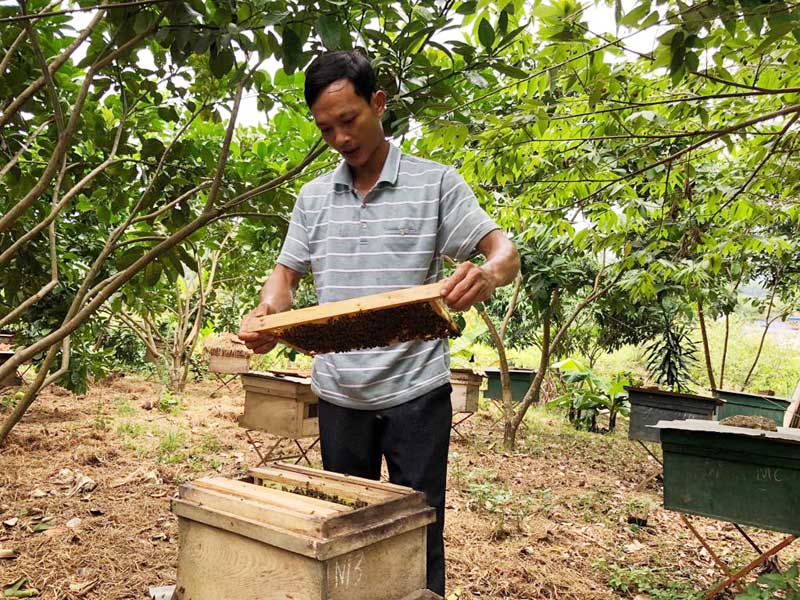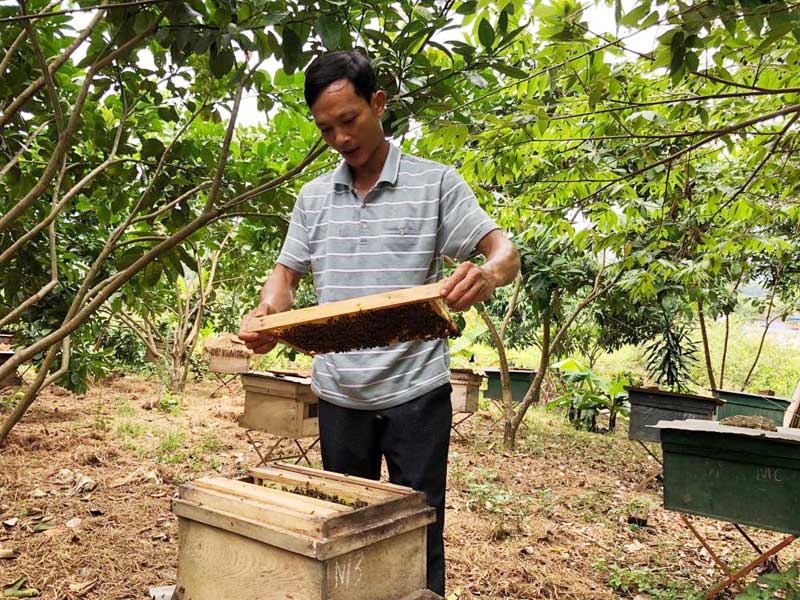
(HBO) – We were being so impressed when visiting the honey beekeeping model of Mr. Nguyen Van Tuoi in Sau Ha village, Thanh Luong commune.

Mr. Nguyen Van Tuoi, the leader of Sau Ha's
beekeeping cooperative group, Thanh Luong commune (Luong Son) is checking the
honey bee layer.
At the beginning time of bee raising, he kept
raising over 100 litters of bees. Then, the number has gradually increased to
200 - 250 litters per year. The food source of bees are trees, fruit trees
around the garden, acacia forest of the family. The nearby forests are also an
important food source for bees to look for food during almost four seasons. Mr
Tuoi said: On average, the family collects more than 1,000 liters of honey each
year. Honey of acacia is usually sold at 120,000 VND / liter, especially, honey
of longan with special taste, sweet taste is always favored by the market with
the higher prices, the average of 200,000 - 220,000 VND / liter; which makes
him get the income from 200 - 250 million VND / year.
In 2016, due to the demand of people with the
same bee keeping hobby in the village, Sau Ha's beekeeping cooperative group
was established with 5 members. Mr Tuoi was elected to be the leader of the
cooperative group. To be compared to the number of bee herds, Mr. Tuoi’s family
had the largest number of bee herds with 250 herds. The remaining households
maintain the number of bee herds from a few dozen or more. The second largest
bee keeping household is the family of Mr. Bui Van Rung with 90 herds. Mr Tuoi
shared: Since joining the cooperative group, every month and quarter, the
members of the group gather to exchange experience. In addition, when needed, the
members meet face-to-face or make a phone calls to help each other a lot in the
career development. The issues of common bee diseases, honey exploitation for
quality, best efficiency, market demand, prices, etc. are all being
enthusiastically supported and open by the members.
At present, Mr. Tuoi has supplied about 1,000
liters of honey to the market. In addition to honey production, he also has a
good income from bee breeding and bee-related supplies. His average annual
income is about 300 million VND.
According to data from the Hoa Binh Provincial Party Committee, the industrial production index for the first six months of 2025 is estimated to have increased by 20% compared to the same period last year. This marks the highest year-on-year growth rate for this period since 2020.
In the first six months of 2025, Hoa Binh province’s export turnover was estimated at 1.145 billion USD, marking an 18.11% increase compared to the same period in 2024. Import turnover was estimated at $ 804 million, a 17.15% increase, which helped the province maintain a positive trade balance.
The lives of the ethnic minority farmers in Tan Lac district have gradually improved thanks to the new directions in agricultural production. This is a testament to the collective strength fostered through the professional associations and groups implemented by various levels of the district’s Farmers’ Union.
With the motto the "product quality comes first,” after nearly one year of establishment and operation, Muong village’s Clean Food Agricultural and Commercial Cooperative, located in Cau Hamlet, Hung Son Commune (Kim Boi district), has launched reputable, high-quality agricultural products to the market that are well-received by consumers. The products such as Muong village’s pork sausage, salt-cured chicken, and salt-cured pork hocks have gradually carved out a place in the market and they are on the path to obtaining the OCOP certification.
In the past, the phrase "bumper harvest, rock-bottom prices" was a familiar refrain for Vietnamese farmers engaged in fragmented, small-scale agriculture. But today, a new spirit is emerging across rural areas of Hoa Binh province - one of collaboration, organisation, and collective economic models that provide a stable foundation for production.
Maintaining growing area codes and packing facility codes in accordance with regulations is a mandatory requirement for agricultural products to be eligible for export. Recently, the Department of Agriculture and Environment of Hoa Binh province has intensified technical supervision of designated farming areas and packing facilities to safeguard the "green passport" that enables its products to access international markets.



